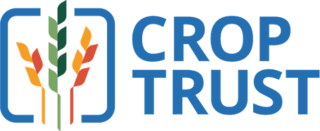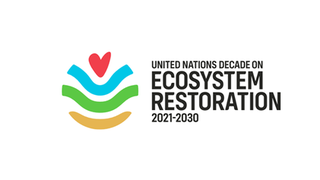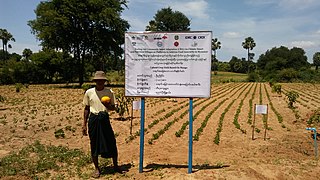Related Research Articles
The following outline is provided as an overview of and topical guide to sustainable agriculture:
Agroecology is an academic discipline that studies ecological processes applied to agricultural production systems. Bringing ecological principles to bear can suggest new management approaches in agroecosystems. The term can refer to a science, a movement, or an agricultural practice. Agroecologists study a variety of agroecosystems. The field of agroecology is not associated with any one particular method of farming, whether it be organic, regenerative, integrated, or industrial, intensive or extensive, although some use the name specifically for alternative agriculture.
IFOAM – Organics International is a worldwide organization advocating for organics, with over 700 affiliates in more than 100 countries and territories.

CGIAR is a global partnership that unites international organizations engaged in research about food security. CGIAR research aims to reduce rural poverty, increase food security, improve human health and nutrition, and sustainable management of natural resources.

The International Center for Tropical Agriculture is an international research and development organization dedicated to reducing poverty and hunger while protecting natural resources in developing countries. It is based in Palmira, Colombia, where it employs over 300 scientists.

The Crop Trust, officially known as the Global Crop Diversity Trust, is an international nonprofit organization with a secretariat in Bonn, Germany. Its mission is to conserve and make available the world's crop diversity for food security.

Landscape-scale conservation is a holistic approach to landscape management, aiming to reconcile the competing objectives of nature conservation and economic activities across a given landscape. Landscape-scale conservation may sometimes be attempted because of climate change. It can be seen as an alternative to site based conservation.
The term food system describes the interconnected systems and processes that influence nutrition, food, health, community development, and agriculture. A food system includes all processes and infrastructure involved in feeding a population: growing, harvesting, processing, packaging, transporting, marketing, consumption, distribution, and disposal of food and food-related items. It also includes the inputs needed and outputs generated at each of these steps. Food systems fall within agri-food systems, which encompass the entire range of actors and their interlinked value-adding activities in the primary production of food and non-food agricultural products, as well as in food storage, aggregation, post-harvest handling, transportation, processing, distribution, marketing, disposal, and consumption. A food system operates within and is influenced by social, political, economic, technological and environmental contexts. It also requires human resources that provide labor, research and education. Food systems are either conventional or alternative according to their model of food lifespan from origin to plate. Food systems are dependent on a multitude of ecosystem services. For example, natural pest regulations, microorganisms providing nitrogen-fixation, and pollinators.
Crop diversity or crop biodiversity is the variety and variability of crops, plants used in agriculture, including their genetic and phenotypic characteristics. It is a subset of a specific element of agricultural biodiversity. Over the past 50 years, there has been a major decline in two components of crop diversity; genetic diversity within each crop and the number of species commonly grown.

The International Bamboo and Rattan Organization (INBAR) is an independent intergovernmental organization established in 1997 to develop and promote innovative solutions to poverty and environmental sustainability using bamboo and rattan.
Miguel Altieri is a Chilean born agronomist and entomologist. He is a Professor of Agroecology at the University of California, Berkeley in the Department of Environmental Science, Policy and Management.

The International Day of Forests was established on the 21st day of March, by resolution of the United Nations General Assembly on November 28, 2013. Each year, various events celebrate and raise awareness of the importance of all types of forests, and trees outside forests, for the benefit of current and future generations. Countries are encouraged to undertake efforts to organize local, national, and international activities involving forests and trees, such as tree planting campaigns, on International Day of Forests. The Secretariat of the United Nations Forum on Forests, in collaboration with the Food and Agriculture Organization, facilitates the implementation of such events in collaboration with governments, the Collaborative Partnership on Forests, and international, regional and subregional organizations. International Day of Forests was observed for the first time on March 21, 2013.

Forest restoration is defined as “actions to re-instate ecological processes, which accelerate recovery of forest structure, ecological functioning and biodiversity levels towards those typical of climax forest” i.e. the end-stage of natural forest succession. Climax forests are relatively stable ecosystems that have developed the maximum biomass, structural complexity and species diversity that are possible within the limits imposed by climate and soil and without continued disturbance from humans. Climax forest is therefore the target ecosystem, which defines the ultimate aim of forest restoration. Since climate is a major factor that determines climax forest composition, global climate change may result in changing restoration aims. Additionally, the potential impacts of climate change on restoration goals must be taken into account, as changes in temperature and precipitation patterns may alter the composition and distribution of climax forests.

The International Institute for Sustainable Development (IISD) is an independent think tank founded in 1990 working to shape and inform international policy on sustainable development governance. The institute has three offices in Canada - Winnipeg, Ottawa, and Toronto, and one office in Geneva, Switzerland. It has over 150 staff and associates working in over 30 countries.
International Institute of Rural Reconstruction, also known as IIRR is a non-profit organization that helps empower rural communities by making them self-sufficient. By offering programs across health, education, environment, and livelihood, its goal is to have rural communities take charge of their own success. The organization has delivered programs to more than 40 countries in Asia, Africa, and Latin America and directly impacted the lives of over 19 million people as of 2019.

The Association of International Research and Development Centers for Agriculture (AIRCA) is an international, non-profit alliance focused on increasing food security by supporting smallholder agriculture and rural enterprise within healthy, sustainable and climate-smart landscapes.

The Global Landscapes Forum (GLF) is a multi-stakeholder forum that facilitates participation in landscape approaches.

The United Nations Decade on Ecosystem Restoration runs from 2021 to 2030. Similar to other nature related international decades, its purpose is to promote the United Nation's environmental goals. Specifically, to facilitate global cooperation for the restoration of degraded and destroyed ecosystems. Along with fostering efforts to combat climate change, safeguard biodiversity, food security, and water supply. While much focus is on promoting restoration activity by national governments, the UN also wishes to promote such efforts from other actors, ranging from the private sector and NGOs to regular individuals.

Climate-smart agriculture (CSA) is an integrated approach to managing land to help adapt agricultural methods, livestock and crops to the effects of climate change and, where possible, counteract it by reducing greenhouse gas emissions from agriculture, while taking into account the growing world population to ensure food security. The emphasis is not simply on carbon farming or sustainable agriculture, but also on increasing agricultural productivity.
A number of movements seek to expand the practice of agroecology in West Africa. Agroecology is a scientific discipline, movement and practice that integrates ecology in agriculture with strong emphasis on diversification, food sovereignty, energy efficiency and sustainability. Agroecological practices apply the systems and knowledge that traditional farmers in the region have developed and inherited. The agroecological social movement empowers smallholder farmers that hold the knowledge of indigenous farming systems, however are recently engulfed by larger farms or are migrating to urban areas, looking for better paying jobs.
References
- ↑ "EcoAgriculture Partners". One Planet network. 2021-09-22. Retrieved 2023-05-29.
- ↑ "Grantee Detail: EcoAgriculture Partners". www.moore.org. Retrieved 2023-05-29.
- ↑ "EcoAgriculture Partners - MacArthur Foundation". www.macfound.org. Retrieved 2023-05-29.
- ↑ "New directions for integrating environment and development in East Africa". International Institute for Environment and Development. Retrieved 2023-05-29.
- ↑ "The infinite win". blogs.worldbank.org. 27 May 2011. Retrieved 2023-05-29.
- ↑ "18 Organizations Promoting Agroecology". Food Tank. 2020-06-04. Retrieved 2023-05-29.
- ↑ "Ecoagriculture: a new and promising land use approach". base.d-p-h.info. Retrieved 2023-05-29.
- ↑ McNeely, J. A.; Scherr, S. J. (2001). "Common ground, common future: how ecoagriculture can help feed the world and save wild biodiversity". Future Harvest, US, IUCN.
- ↑ "Scherr, Sara". www.bioversityinternational.org. Retrieved 2023-05-29.
- ↑ Encyclopedia of agriculture and food systems. Neal K. Van Alfen. Amsterdam. 2014. p. 2. ISBN 978-0-08-093139-5. OCLC 889241092.
{{cite book}}: CS1 maint: location missing publisher (link) CS1 maint: others (link) - ↑ "Public Policy to Support Landscape and Seascape Partnerships: Meeting Sustainable Development Goals through Collaborative Territorial Action". CALS. Retrieved 2023-05-29.
- 1 2 Farming with nature : the science and practice of ecoagriculture. Sara J. Scherr, Jeffrey A. McNeely. Washington: Island Press. 2007. ISBN 978-1-4356-7661-9. OCLC 427509919.
{{cite book}}: CS1 maint: others (link) - ↑ "Ecoagriculture Partners". Changing The Present. Retrieved 2023-05-29.
- ↑ "Ecoagriculture Partners". Philanthropy News Digest. December 1, 2009.
- ↑ Buck, L. E.; Gavin, T. A.; Lee, D. R.; Uphoff, N. T. (2004). "Ecoagriculture: A review and assessment of its scientific foundations".
{{cite journal}}: Cite journal requires|journal=(help) - ↑ "Agroecology versus ecoagriculture: Balancing food production and biodiversity conservation in the midst of social inequity | HimalDoc". lib.icimod.org. Retrieved 2023-05-29.
- ↑ "EcoAgriculture Partners". INITIATIVE 20X20. Retrieved 2023-05-29.
- ↑ "EcoAgriculture Partners". ccafs.cgiar.org. Retrieved 2023-05-29.
- ↑ "Partners | IAFN / RIFA" . Retrieved 2023-05-29.
- ↑ "EcoAgriculture Partners". Commonland. Retrieved 2023-05-29.
- ↑ "Landscapes for People, Food, and Nature | AFR100". afr100.org. Retrieved 2023-05-29.
- ↑ "Celebrating the Landscapes for People, Food and Nature (LPFN) initiative, 2011-2020 | FAO in North America | Продовольственная и сельскохозяйственная организация Объединенных Наций". www.fao.org. Retrieved 2023-05-29.
- ↑ Hub, IISD's SDG Knowledge. "Landscapes for People, Food and Nature Initiative Launched | News | SDG Knowledge Hub | IISD" . Retrieved 2023-05-29.
- ↑ "A Global Initiative on Landscapes for People, Food and Nature". Global Environment Facility. Retrieved 2023-05-29.
- ↑ "Business for Sustainable Landscapes: An action agenda for sustainable development". IUCN. 2017. Retrieved 2023-05-29.
- ↑ "Promoting Climate Smart Agriculture in the U.S. | FAO in North America". www.fao.org. Retrieved 2023-05-29.
- ↑ https://www.climatehubs.usda.gov/sites/default/files/Climate%20Hubs%20Quarterly%20Report%20FY18%20Q4%20Newsletter%20Final.pdf
- ↑ "Empowering Regional and District Level Planners in Tanzania to Address Climate Change Threats to Agriculture | News | Tanzania | Archive - U.S. Agency for International Development". 2017-2020.usaid.gov. 2020-10-26. Retrieved 2023-05-29.
- ↑ "Landscape Finance: Investing in Innovation for Sustainable Landscapes". My Mooc. Retrieved 2023-05-29.
- 1 2 United Nations Environment Programme, Food and Agriculture Organization of the United Nations (2020). Resilient Food Systems – Strategy report: Regional Hub Component 1 Science and Policy Interface. Food and Agriculture Organization of the United Nations. ISBN 9789251328606.
- ↑ "About 1000 Landscapes". Terraso. 2021-10-01. Archived from the original on 2023-03-20. Retrieved 2023-05-29.
- ↑ Sawy, Nada El (2022-11-17). "Biodiversity activists at Cop27 call for 'Paris Agreement for nature'". The National. Retrieved 2023-05-29.
- ↑ "A new report from EcoAgriculture Partners reviews models of integrated landscape finance". CPIC. 2020-09-14. Retrieved 2023-05-29.
- ↑ "U.S. Compendium of SFS Actions". www.usda.gov. Retrieved 2023-05-29.
- ↑ "Public policy to support landscape and seascape partnerships: Meeting Sustainable Development Goals through collaborative territorial action". Evidensia. Retrieved 2023-05-29.